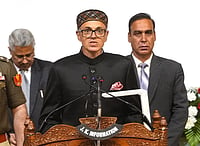NASA officials on Thursday said that no return date is fixed for the return of its astronauts Sunita Williams and Butch Wilmore, adding that they will remain at the International Space Station until engineers finish working on problems on their Boeing Starliner.
No Return Date For Sunita Williams' Boeing Starliner At ISS, Says NASA
NASA's commercial crew program manager Steve Stich said that mission managers were not ready to announce a return date.

The Starliner's Boeing capsule was sent on week-long mission, however, it has ended staying up at the ISS for more than a month. The mission has completed 50 days now.
NASA's commercial crew program manager Steve Stich said that mission managers were not ready to announce a return date.
The Indian-origin astronaut and Wilmore remain in space due to the thruster failures and helium leaks on the Starliner capsule, prompting NASA and Boeing to keep them up there for longer.
Engineers last week completed testing a spare thruster in New Mexico desert to try to understand what went wrong during the capsule's docking at the ISS, the Associated Press reported.
The team has been preparing to bring back home the two NASA astronauts. Notably, as the Starliner capsule approached the space station on June 6, a day after its lift-off, five thrusters failed. Since then, four thrusters have been reactivated.
This was Boeing's first test flight with a crew on board.
Sunita Williams 'Gardening' In Space
Since being in space for more than the mission's designated time, space veteran Sunita Williams -- on her third mission to space -- has been investigating growing plants in space.
She has been using fluid physics to overcome the lack of gravity when watering and taking care of the plants. This is an important aspect for gardening in space, a viral step towards understanding how plants grow in microgravity conditions.
This research will play a key role when humans try to establish various bases in the solar system and beyond.
Using an ultrasound device, Williams and Wilmore also took part in vein scans. Doctors on the ground monitored their veins' imaging. The two astronauts took turns in imaging each other's veins in their neck, shoulder and legs.
Advanced biology research is also underway aboard the ISS and astronauts are exploring how living in space affects human's body and minds, NDTV reported.
Williams extracted DNA to identify microbe samples that were collected from the water systems aboard the space station. Results from this genetic biotechnology experiment might improve ways to keep the space crews' healthy and the spacecraft systems clean.
- Previous Story
 Kamala Harris Promises To Legalise Marijuana, Pass George Floyd Policing Act
Kamala Harris Promises To Legalise Marijuana, Pass George Floyd Policing Act - Next Story





















